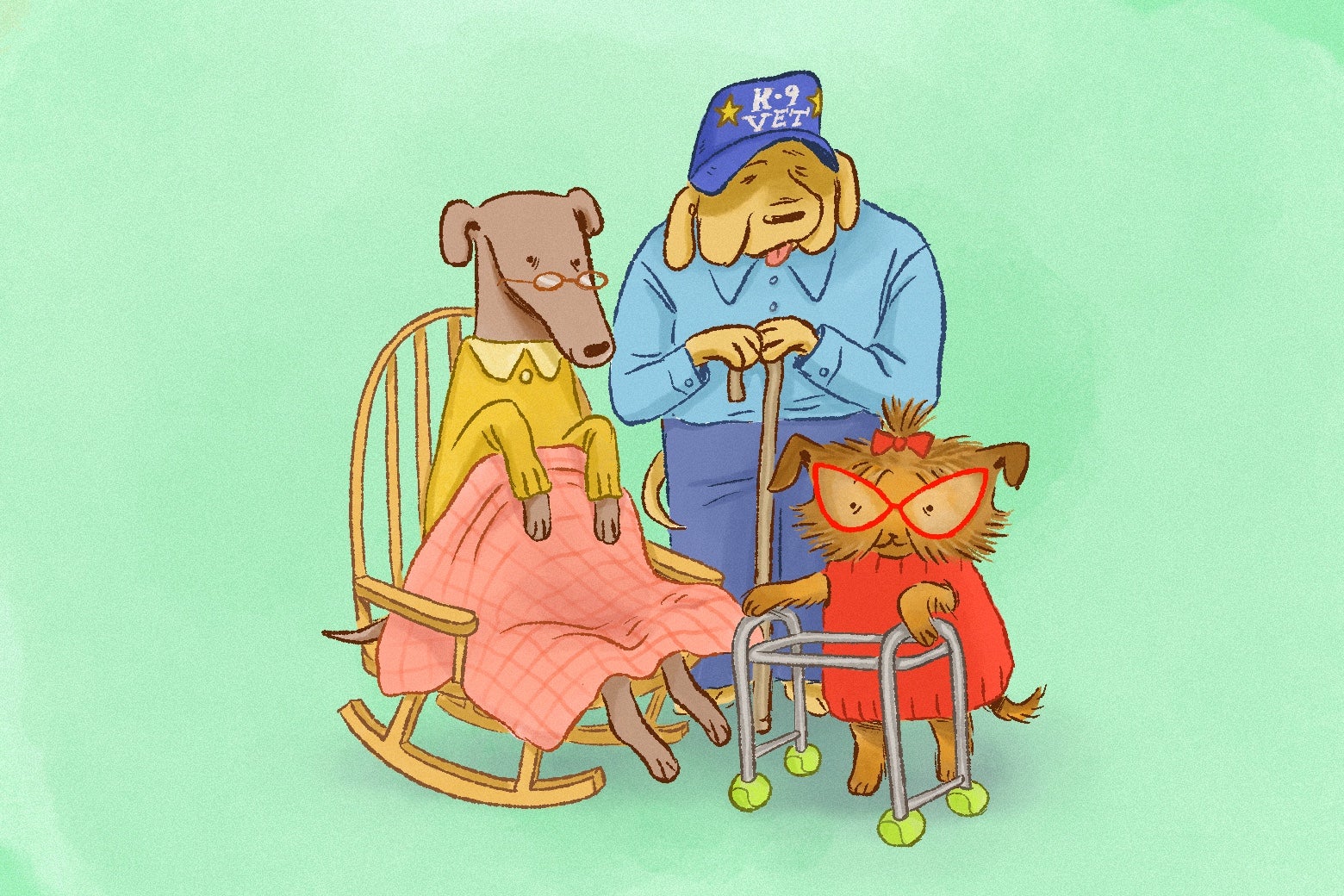The drug could keep your pet around for longer—but some vets and ethicists worry that we might be barking up the wrong tree.

Sign up for the Slatest to get the most insightful analysis, criticism, and advice out there, delivered to your inbox daily.
When Emily, a 12-year-old black Labrador retriever in Texas, began showing signs of old age— intermittent limping and inability to jump on the bed—her owner, Maxine Clegg, started getting nervous about her best friend.
“Emily knew me before kids,” the mom of two told Slate. “She’s seen me through getting married, building a family, my husband’s deployments, and moves all around the country. She’s one of us.” Clegg, a schoolteacher, tears up at the idea of losing her best friend one day. “I don’t know life without her and I’d do whatever it takes to give her more time with us,” she said.
Clegg isn’t an outlier; 76 percent of pet owners say they’d go into debt to prolong their animal’s life, according to a survey from personal finance website ValuePenguin. As it turns out, that medical miracle may not be far off. Loyal, a pet biotech company founded by Celine Halioua, aims to extend the lifespan of dogs by preventing—or delaying—age-related disease.
The California-based entrepreneur told Slate she founded Loyal because she was motivated by one question: What if we could develop a preventive medicine for seemingly unrelated age-associated diseases? By that she means age-associated diseases like cancer, arthritis, and cognitive decline—which don’t necessarily appear to be related yet often share the same root cause. However, as dogs age, metabolic dysfunction (which is what happens when the body’s ability to regulate insulin, adipose tissue, and blood lipids declines) increases the risk of developing these sorts of diseases.
“The goal of the company from Day 1 has always been to get the first drug FDA approved for healthy lifespan extension,” Halioua told Slate. And she’s close—or at least, she claims to be.
In February 2025, LOY-002—a prescription pill from Loyal designed to extend healthy lifespan in senior dogs of nearly every size by targeting metabolic dysfunction—received its preliminary efficacy acceptance from the FDA, paving the way for it to potentially become the first-ever drug to give dogs more time with their families. Halioua now expects the drug to be approved within the next year and available at vet clinics shortly after.
In theory, sustaining a dog’s metabolic health—the regulation of blood sugar and insulin levels, fat distribution and function, and the balance of key hormones—can delay and potentially even prevent age-associated diseases such as arthritis, cognitive decline, and cancer, and give dogs more and healthier years. Loyal pointed to a set of studies out of the Purina Institute in the early 2000s that looked at cutting calories for dogs in a way that didn’t lead to vitamin or nutrient deficiencies. The studies found that Labradors that received 25 percent fewer calories than their littermates lived almost two years longer and saw a similar delay in the onset of age-associated disease.
Halioua was unable to provide an exact price range for a future commercial treatment. Veterinarians participating in Loyal’s clinical trials were unreachable for comment.
This is the first of three drugs Loyal is working on for dogs. While LOY-002 targets senior dogs of every size, LOY-001 and LOY-003 are focused on extending the lifespan of large dogs, which can have much shorter lifespans than smaller dogs. The drugs do this by reducing adult levels of a growth hormone called IGF-1, or Insulin-like Growth Factor, which occurs in much higher concentrations in large breed dogs and has been shown to shorten lifespan in other species, Halioua explained.
“We’re the recipient of both the first and second FDA acknowledgements that a drug can be effectively developed for lifespan extension, in any species,” Halioua, who does not have a background in veterinary medicine, said. She added that the drug could eventually help researchers develop treatments to extend the healthspan and lifespan of species like humans, too.
It’s a huge step for a country that is nothing short of obsessed with their dogs. Nearly 46 percent of U.S. households own a dog and Pew Research suggests that most consider their dog a member of the family—and the monetary figures back it up. In 2024, Americans spent an estimated $150.6 billion on their pets, a figure that has only increased since the American Pet Products Association began tracking in 2018.
“Pet parents don’t just want their dogs to live longer, they want them to be healthier for longer,” Monica Tarantino, who is a veterinarian and the co-founder of the Senior Dog Veterinary Society, and who did not take part in Loyal’s initial research, told Slate. Tarantino said she is “really excited” about the drug, because one of the most challenging parts of owning a pet is watching decline from age-related diseases.
“If their drug proves to be effective, it could give veterinarians something we’ve never had before: an evidence-based way to help dogs not just live longer, but live better.” She added that she’s impressed by Loyal’s data-driven approach—which many supplements that claim to support dog aging or longevity lack. “Having an additional tool in the form of a well-researched drug could be a huge step forward in veterinary medicine.”
In fact, Tarantino has started the enrollment process for her own dog, an 11-year-old husky mix named Jose, in STAY, Loyal’s latest pivotal effectiveness trial for LOY-002’s Food and Drug Administration approval submission, which will run over the course of four years and aims to enroll up to 1,300 dogs.
Because it’s a double-blind, placebo-controlled study, if Jose is accepted, Tarantino will not know whether or not her dog is receiving the drug. Regardless, she is motivated to help LOY-002 reach approval.
“It’s not just about having more time,” Tarantino said. “It’s about having more good time with dogs. Whether it’s months or years, any extra time where they’re still happy, mobile, and feeling like themselves is incredibly meaningful.”
No one understands the desperate plea for more time more than Daniela Korec, a veterinary oncologist who focuses on helping her patients maintain quality of life while undergoing cancer treatments. “Getting more time is the No. 1 thing I hear from people,” Korec, who has treated more than 4,000 animals in her career, told Slate.
But Korec says it is important to differentiate quantity and quality, especially when it comes to lifespan. “Just because you have a living creature—and by living I mean drinking, eating, peeing, and pooping—is that an animal that actually wants to be here, and is enjoying their life?” Korec said, adding that it’s easy to lose sight of that as a devoted pet owner, herself included.
She also has concerns about the potential side effects of inhibiting a bodily function long-term. Though Loyal reported “no clinically significant adverse effects” in their pilot study that was submitted to the FDA for preliminary efficacy acknowledgement, it was only 48 dogs over the course of three months.
“I think the big question that everyone should have is: What does this drug mean for how dogs are actually living? What does it mean for their likelihood of developing diseases in the long run?” Korec said, adding that while she remains hopeful, she is approaching the advancement with “a dose of skepticism” until she’s able to see the drug’s full composition and have access to retrospective data.
Jessica Pierce, a bioethicist who focuses on the ethical implications of biomedical sciences in human-animal relationships, agreed. She told Slate that there is no real benefit for the dogs in the conversation of prolonging their natural lifespan.
“These drugs are not about dogs or dog welfare. They’re about humans and what humans want,” Pierce said, adding that she believes Loyal sees the financial gain in developing and marketing a drug that capitalizes on the emotional framework of humans. “It’s not for dogs, and we shouldn’t fool ourselves into thinking that it is.”
The bottom line, Pierce explained, is that animals being given these drugs cannot consent, and unlike in parenting a human child, there are no guardrails for pets about what can—and cannot—be done to them.
“Dogs don’t have any choice in the matter—and that’s problematic for dogs,” she said, adding that she worries about the ability of pet owners to make realistic quality-of-life assessments about their pets. The Colorado-based author also underscored that a difference exists between drugs that help dogs live healthier, more comfortable lives—such as a thyroid medication—and those that tout life extension.
“The decisions that a human makes for them may have a profound capacity to inflict suffering, and that’s one of the things that worries me about this type of intervention,” Pierce explained. “So many people keep their animals alive so much past a point where it’s humane or compassionate.”
As for Clegg, she clings to the idea of keeping Emily around longer, but knows she can’t be selfish.
“When I hear her paws on the floor coming to greet me after work, I think, Just a little more time, please,” she said. “But if Emily isn’t having a good time anymore—if she can’t walk or control going to the bathroom—I can’t play God. That isn’t any way to live.”
Sign up for Slate’s evening newsletter.









 English (US) ·
English (US) ·